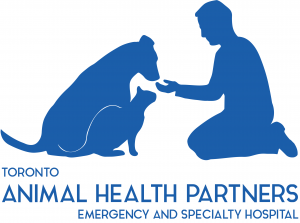MY DOG HAS AN ACL INJURY? WHAT DO I DO?

Written by Debbie Reynolds, BVSc, DACVS

Cranial cruciate ligament (CCL) disease (ACL injury in people) is the most common cause of limping on the back leg in dogs. The cause of CCL injuries in dogs is thought to be a disease process with slow progression of clinical signs with most owners reporting intermittent lameness following exercise and improvement after rest, which is consistent with the slow degeneration of the ligament in the knee. Often this becomes a persistent lameness following “jumping off the deck” or “chasing a squirrel”, at which time either the cruciate ligament completely tears or there is damage to the meniscus (cartilage in the knee). Unfortunately, because it seems to be a disease, not a sporting injury in dogs, it is not uncommon for the other knee to be affected at the time of diagnosis or become affected at a later date (within 12 to 18 months).
What do I do if I suspect a cruciate injury?
If your dog is limping on the back leg, an assessment by your veterinarian is advised to rule out a cruciate injury. There are many other causes of lameness in the back leg which need to be ruled out. Your family vet may recommend radiographs of the knee and hips. Radiographs of the knee typically show early arthritis (blue arrows) and “effusion” or fluid (red circle) within the knee joint which is consistent with a knee problem. On physical examination, instability of the knee is usually felt along with discomfort. Other diagnostic tests that can be performed if the injury is not obvious is an MRI of the knee, although this is not usually needed.
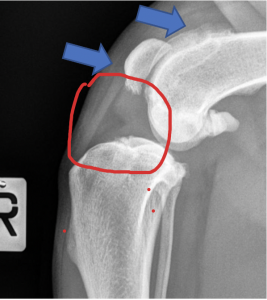
What are my options for treatment?
Cruciate ligament injury can be managed medically in dogs under 10 kg as long as there are no other knee problems such as unstable knee caps or cartilage injuries. Medical management involves strict rest for 6 weeks (leash walks to bathroom, no running or jumping) with a slow gradual return to activity over a further 6 weeks. If the limping continues, then surgery is recommended.
For dogs over 15 kg, cruciate ligament injury is best treated with surgery to slow the progression of arthritis and return them to normal function. There are many surgical options but the most common are the lateral suture or tightrope (replaces the function of the cruciate to stabilize the knee) or the TPLO (eliminates the need for an intact cruciate). The TPLO (see radiographs) seems to provide advantages for faster return to activity and lower failure rate, with over 95% of dogs being able to return to normal function following surgery.
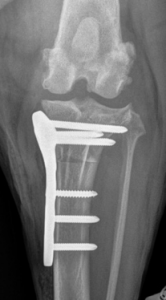
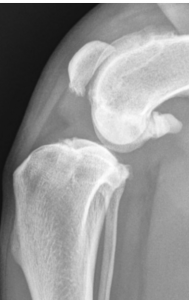
What about knee braces and physiotherapy?
Knee braces do not fix the cruciate in a dog and typically only help to reduce the inflammation in the knee. They are needed for the rest of the dogs life whenever they are active. Typically knee braces are reserved for dogs that cannot undergo surgery for other medical reasons.
Physiotherapy is excellent to maintain muscle mass before surgery and in the post surgery recovery period but will not “fix the cruciate”.
What is the recovery from surgery like?
Following either surgery, it is a 12-week period of restricted activity. For the lateral suture it is 6 to 8 weeks of strict rest, followed by a gradual return to activity. For the TPLO it is 2 weeks of on leash to the bathroom only with dogs typically weight bearing on the limb within 2-3 days. After 2 weeks, there is a gradual increase of on leash walking until the bone has healed and then they can return to normal activity.
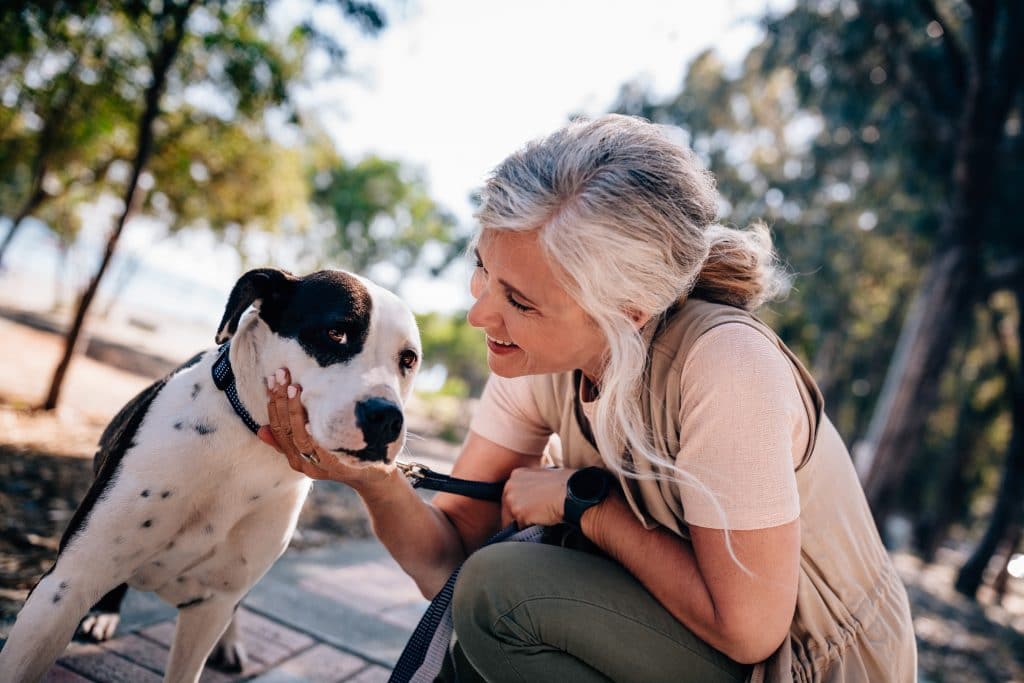
About The Company
Animal Health Partners Toronto is a new veterinary emergency and specialty hospital modeled after best practices in human medicine. Lead by a team of highly qualified veterinary specialists, Animal Health Partners Toronto Emergency and Specialty Hospital is bringing the world’s best practices of private human healthcare to veterinarian care.
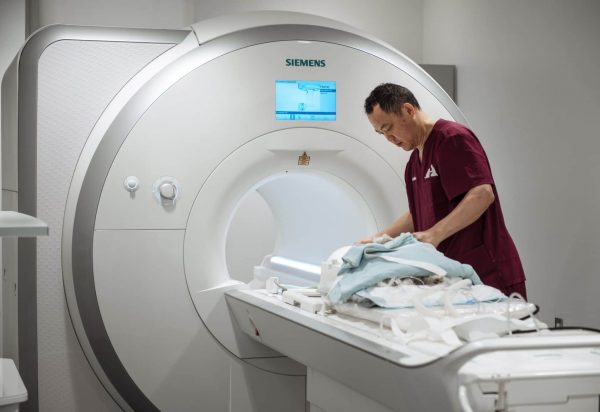
The technical proficiency and medical equipment at Animal Health Partners equals or exceeds that found in sophisticated human hospitals.
Animal Health Partners provides the highest-quality Veterinarian Services in Toronto. Our specialists combine their collective knowledge and skill in the treatment of complex or multifaceted cases. We serve as an extension of your family veterinarian and provide exceptional specialty care by treating our patients as if they were our own pets.
Our Core Values
Quality
At the root of all we do at Animal Health Partners is a commitment to the highest quality of veterinary care. This means that the diagnostic tests we run and the treatments we provide are informed by the best available scientific evidence and implemented by the most highly qualified veterinarians and staff.
Compassion
We understand that the experience of illness and injury can be painful and scary for pets and their owners. We strive to reduce discomfort as much as possible using gentle handling techniques, appropriate pain-management, stress-reducing design features, non-invasive interventions and a continuous emphasis on empathic patient-centered care.
Service
Intrinsic to our goal of providing the highest quality of medicine is providing efficient, courteous, attentive and responsive service to the owners and referring veterinarians that have entrusted us with the care of their pets and patients.
Innovation
Medicine is rapidly evolving. Our technologically advanced institution is equipped to employ and pioneer the most cutting-edge diagnostic and treatment modalities available in veterinary medicine with the goal of improving the quality of care for all patients.
Partnership
High-quality care and optimal patient outcomes rely not on any one individual but on the strength of the connections between many. Ensuring the best possible outcomes for our patients means creating solid partnerships with their owners and referring veterinarians. It also means establishing relationships more broadly with the community, the human medical field and with industry.
About The Company
Animal Health Partners Toronto is a new veterinary emergency and specialty hospital modeled after best practices in human medicine. Lead by a team of highly qualified veterinary specialists, Animal Health Partners Toronto Emergency and Specialty Hospital is bringing the world’s best practices of private human healthcare to veterinarian care.

The technical proficiency and medical equipment at Animal Health Partners equals or exceeds that found in sophisticated human hospitals.
Animal Health Partners provides the highest-quality Veterinarian Services in Toronto. Our specialists combine their collective knowledge and skill in the treatment of complex or multifaceted cases. We serve as an extension of your family veterinarian and provide exceptional specialty care by treating our patients as if they were our own pets.
Our Core Values
Quality
At the root of all we do at Animal Health Partners is a commitment to the highest quality of veterinary care. This means that the diagnostic tests we run and the treatments we provide are informed by the best available scientific evidence and implemented by the most highly qualified veterinarians and staff.
Compassion
We understand that the experience of illness and injury can be painful and scary for pets and their owners. We strive to reduce discomfort as much as possible using gentle handling techniques, appropriate pain-management, stress-reducing design features, non-invasive interventions and a continuous emphasis on empathic patient-centered care.
Service
Intrinsic to our goal of providing the highest quality of medicine is providing efficient, courteous, attentive and responsive service to the owners and referring veterinarians that have entrusted us with the care of their pets and patients.
Innovation
Medicine is rapidly evolving. Our technologically advanced institution is equipped to employ and pioneer the most cutting-edge diagnostic and treatment modalities available in veterinary medicine with the goal of improving the quality of care for all patients.
Partnership
High-quality care and optimal patient outcomes rely not on any one individual but on the strength of the connections between many. Ensuring the best possible outcomes for our patients means creating solid partnerships with their owners and referring veterinarians. It also means establishing relationships more broadly with the community, the human medical field and with industry.
[
